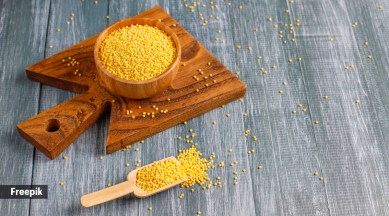📣 For more lifestyle news, click here to join our WhatsApp Channel and also follow us on Instagram
Why whole grains are touted as the ‘storehouse of good health’
Lovneet Batra, a nutritionist, took to her Instagram to share the many benefits of whole grains

In the last few years, our focus on healthy living and eating has increased manifold. The reason is simple, we have realised that eating clean and nutritious foods, sleeping well, and exercising regularly will help keep many diseases at bay. Amid this health-conscious wave, many foods and drinks have also become quite sought after owing to their benefits. One such food is whole grains — which includes rajgira or amaranth, kuttu or buckwheat, sabudana or pearl sago, lapsi or broken wheat or dalia, barley or sattu or jau, ragi or finger millet, bajra or pearl millet, jowar or sorghum.
According to Neha Patodia, co-founder and consultant nutritionist, Nutrimend, one should have whole grains or healthy carbohydrates that pack a lot of nutrition as they are nutrient-dense and have fibre. Such foods are millets, quinoa, oats, rice, whole wheat bread, bagels, fresh fruits, potatoes, and sweet potatoes, steel-cut and old-fashioned oats, jowar, amaranth, corn, and barley. “It’s advisable to do a mix of starches and add a wide variety of colourful fruits and vegetables to the diet,” Patodia told indianexpress.com.
monthly limit of free stories.
with an Express account.
So, it was not surprising to see Lovneet Batra, a nutritionist, taking to her Instagram to share the many benefits of whole grains. “You’ve likely heard that whole grains are so much healthier than refined grains but probably you don’t have an idea why they are touted as the storehouse of good health,” she captioned her post, further listing some of the reasons that make whole grains a must-add option to your diet plan.
*Manages sugar levels: Whole grains are considered to have a low glycemic index, and therefore help manage blood glucose levels better. Further, it’s important to supply the body with the key nutrients needed for managing blood sugar levels. The presence of minerals such as magnesium and chromium, phytochemicals, organic acids, and enzyme inhibitors in wholegrain foods along with high fiber content work together to stabilising sugar levels.
*Supports heart health: According to studies, intake of whole grain and bran has been associated with a 16-30% lower risk of cardiovascular and coronary heart disease. Furthermore, certain compounds in whole grains, such as fiber, vitamin K, and antioxidants, can reduce your risk of stroke, too.
*Regulates hormonal imbalances: Whole grains contain compounds called lignans that have a weak hormone-like effect that may help you achieve a better hormonal balance. Whole grains are also a good source of vitamin B6 which is thought to play a useful role in managing hormones and alleviating premenstrual symptoms like bloating, mood swings, and period pains.
*Reduces chronic inflammation: Inflammation is at the root of many chronic diseases. Whole grain have been reported to affect serum levels of inflammatory cytokines.
So, when are you including whole grains in your diet?
📣 For more lifestyle news, follow us on Instagram | Twitter | Facebook and don’t miss out on the latest updates!
📣 For more lifestyle news, click here to join our WhatsApp Channel and also follow us on Instagram